For the 2025 school year, there is 1 public preschool serving 554 students in Smyrna School District. This district's average pre testing ranking is 7/10, which is in the top 50% of public pre schools in Delaware.
Public Preschool in Smyrna School District have an average math proficiency score of 37% (versus the Delaware public pre school average of 17%), and reading proficiency score of 37% (versus the 22% statewide average).
Minority enrollment is 56% of the student body (majority Black), which is equal to the Delaware public preschool average of 56% (majority Black).
Overview
This School District
This State (DE)
# Schools
8 Schools
27 Schools
# Students
6,010 Students
7,056 Students
# Teachers
378 Teachers
743 Teachers
Student : Teacher Ratio
16:1
16:1
District Rank
Smyrna School District, which is ranked within the bottom 50% of all 42 school districts in Delaware (based off of combined math and reading proficiency testing data) for the 2021-2022 school year.
The school district's graduation rate of 88% has decreased from 89% over five school years.
Overall District Rank
#22 out of 42 school districts
(Bottom 50%)
(Bottom 50%)
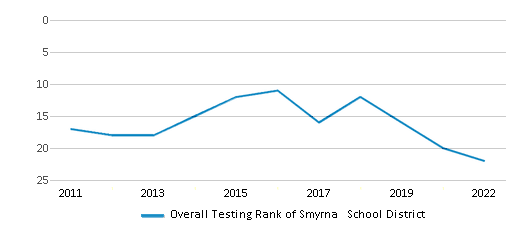
Math Test Scores (% Proficient)
26%
29%
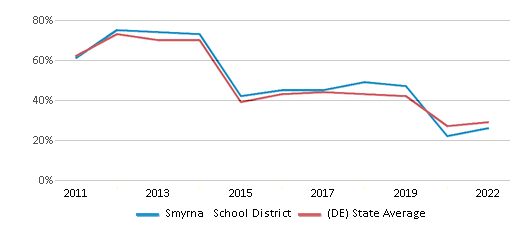
Reading/Language Arts Test Scores (% Proficient)
39%
42%
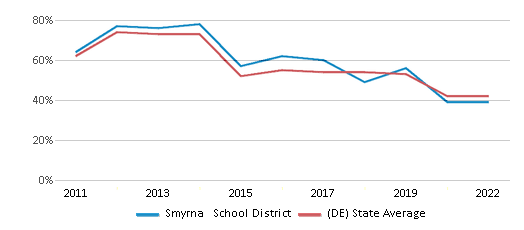
Science Test Scores (% Proficient)
18%
21%
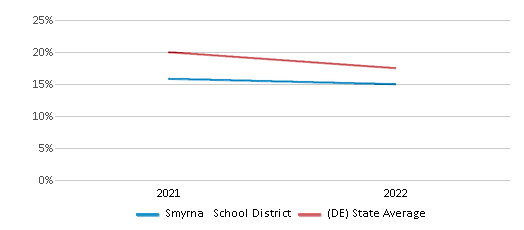
Graduation Rate
88%
88%
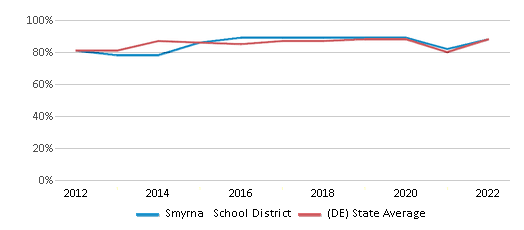
Students by Ethnicity:
Diversity Score
0.63
0.69
# American Indian Students
14 Students
19 Students
% American Indian Students
n/a
n/a
# Asian Students
84 Students
296 Students
% Asian Students
2%
4%
# Hispanic Students
551 Students
1,147 Students
% Hispanic Students
9%
16%
# Black Students
2,003 Students
2,136 Students
% Black Students
33%
30%
# White Students
3,048 Students
3,074 Students
% White Students
51%
44%
# Hawaiian Students
6 Students
2 Students
% Hawaiian Students
n/a
n/a
# Two or more races Students
304 Students
382 Students
% of Two or more races Students
5%
6%
Students by Grade:
# Students in PK Grade:
128
2,357
# Students in K Grade:
392
2,474
# Students in 1st Grade:
375
430
# Students in 2nd Grade:
450
441
# Students in 3rd Grade:
439
219
# Students in 4th Grade:
446
113
# Students in 5th Grade:
468
106
# Students in 6th Grade:
513
97
# Students in 7th Grade:
498
86
# Students in 8th Grade:
511
104
# Students in 9th Grade:
466
88
# Students in 10th Grade:
476
88
# Students in 11th Grade:
428
78
# Students in 12th Grade:
420
375
# Ungraded Students:
-
-
District Revenue and Spending
The revenue/student of $15,145 in this school district is less than the state median of $20,321. The school district revenue/student has stayed relatively flat over four school years.
The school district's spending/student of $14,003 is less than the state median of $18,401. The school district spending/student has stayed relatively flat over four school years.
Total Revenue
$91 MM
$2,882 MM
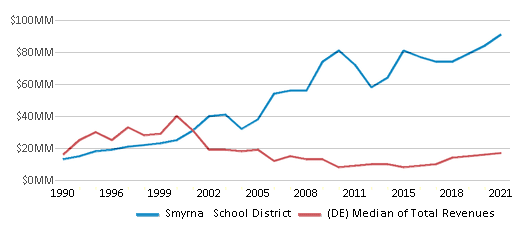
Spending
$84 MM
$2,610 MM
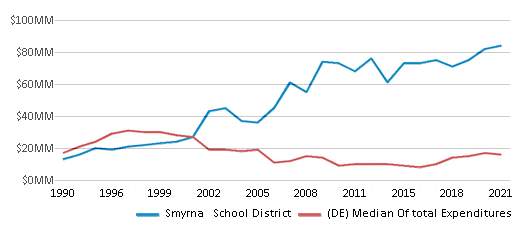
Revenue / Student
$15,145
$20,321
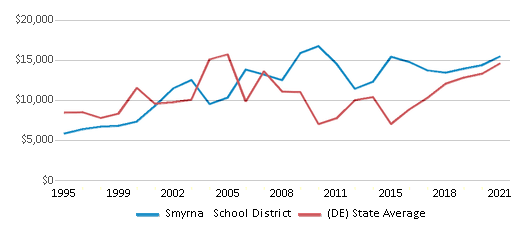
Spending / Student
$14,003
$18,401
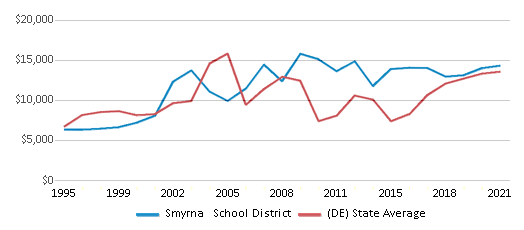
Best Smyrna School District Public Preschools (2025)
School
(Math and Reading Proficiency)
(Math and Reading Proficiency)
Location
Grades
Students
Rank: #11.
North Smyrna Elementary School
(Math: 35-39% | Reading: 35-39%)
Rank:
Rank:
7/
Top 50%10
365 North Main Street
Smyrna, DE 19977
(302) 653-8589
Smyrna, DE 19977
(302) 653-8589
Grades: PK-3
| 554 students
Recent Articles

Year-Round Or Traditional Schedule?
Which is more appropriate for your child? A year-round attendance schedule or traditional schedule? We look at the pros and cons.

Why You Should Encourage Your Child to Join a Sports Team
Participating in team sports has a great many benefits for children, there is no doubt. In this article you will learn what those benefits are.

White Students are Now the Minority in U.S. Public Schools
Increasing birth rates among immigrant families from Asia and Central and South America, combined with lower birth rates among white families, means that for the first time in history, public school students in the United States are majority-minority. This shift in demographics poses difficulties for schools as they work to accommodate children of varying language abilities and socio-economic backgrounds.





